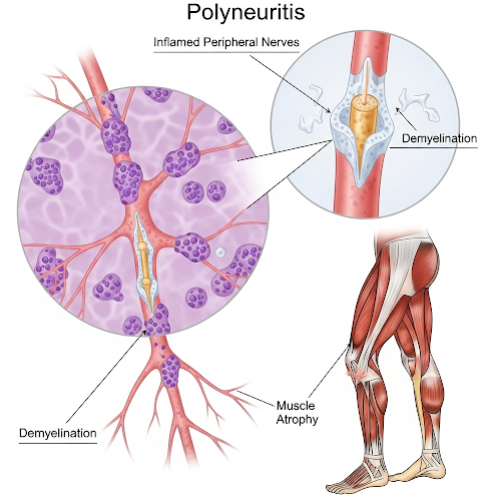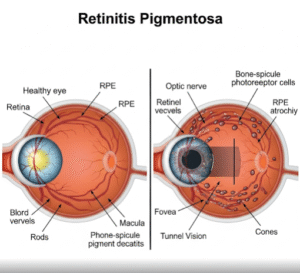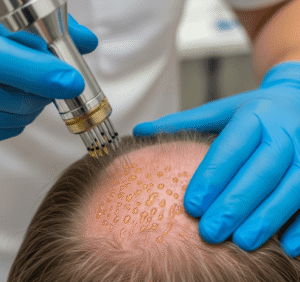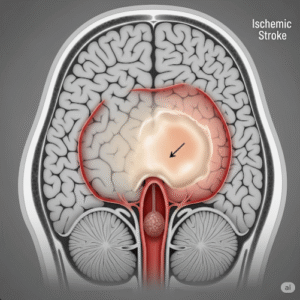Overview
Polyneuritis, also known as polyneuropathy, is a condition involving inflammation and dysfunction of multiple peripheral nerves throughout the body. These nerves control movement, sensation, and autonomic functions. When they become damaged or inflamed, patients may experience pain, weakness, tingling, and numbness, typically starting in the hands and feet. Polyneuritis is a broad term and can be caused by a wide range of underlying conditions, from infections to autoimmune diseases and metabolic disorders.
What is Polyneuritis?
Polyneuritis refers to a diffuse and often symmetrical inflammation of peripheral nerves. It is different from mononeuritis, which affects a single nerve. Depending on the type of nerve fibers involved (motor, sensory, or autonomic), the symptoms can vary widely.
Common types of polyneuritis include:
- Guillain-Barré Syndrome (GBS) – an acute autoimmune polyneuritis
- Diabetic polyneuropathy – a chronic metabolic form
- Alcoholic neuropathy – caused by chronic alcohol use and malnutrition
- Toxic or drug-induced polyneuropathy
Symptoms
Symptoms of polyneuritis typically develop gradually and may become more noticeable over time. They often begin in the feet and hands (a pattern called “stocking and glove”) and may spread upward.
Common symptoms include:
- Tingling or “pins and needles” sensation
- Numbness or reduced sensation
- Muscle weakness, especially in the legs
- Burning or shooting pain
- Difficulty walking or loss of coordination
- Muscle cramping or twitching
- Sensitivity to touch
- Low blood pressure, dizziness (autonomic involvement)
- Bladder or bowel dysfunction (in severe cases)
Causes
Polyneuritis can result from many different underlying causes. Some of the most common include:
- Diabetes mellitus
- Autoimmune diseases (e.g., lupus, Guillain-Barré syndrome)
- Viral or bacterial infections (e.g., HIV, Lyme disease, hepatitis)
- Toxins and heavy metals (e.g., lead, arsenic)
- Chronic alcohol abuse
- Vitamin deficiencies, especially B1, B6, B12
- Medications and chemotherapy
- Kidney or liver failure
- Genetic conditions (e.g., Charcot-Marie-Tooth disease)
Risk Factors
Several factors may increase the risk of developing polyneuritis:
- Uncontrolled diabetes
- Chronic alcohol use
- Nutritional deficiencies
- Exposure to neurotoxic drugs or chemicals
- Autoimmune conditions
- History of infections or recent vaccination (in GBS)
- Older age
- Family history of neuropathy
Complications
Without proper treatment, polyneuritis can lead to serious complications:
- Chronic pain and disability
- Muscle atrophy or permanent weakness
- Increased risk of falls or injury
- Impaired mobility and independence
- Autonomic dysfunction, such as irregular heart rate or blood pressure
- Depression or anxiety due to chronic symptoms
In acute cases like Guillain-Barré syndrome, respiratory failure may occur if not treated promptly.
Prevention
While not all forms of polyneuritis can be prevented, several steps can reduce the risk:
- Manage diabetes effectively
- Avoid excessive alcohol consumption
- Take vitamin supplements if deficient
- Practice safe medication use (avoid known neurotoxic drugs when possible)
- Vaccinate against preventable infections
- Maintain a balanced, nutrient-rich diet
- Avoid exposure to toxins and heavy metals
- Routine health screenings for those at risk
Early intervention can prevent progression and improve long-term outcomes.
Treatment Options in Korea
South Korea provides excellent care for neurological disorders like polyneuritis, with access to neurology specialists, advanced diagnostics, and rehabilitation services.
1. Diagnosis and Evaluation
- Nerve conduction studies (NCS) and electromyography (EMG)
- Blood tests for vitamin levels, autoimmune markers, infections
- Lumbar puncture (in suspected Guillain-Barré syndrome)
- MRI or nerve biopsy (in rare cases)
- Autonomic function testing
2. Medical Treatments
- Corticosteroids or immunosuppressants (for autoimmune forms)
- Intravenous immunoglobulin (IVIG) or plasmapheresis (in GBS)
- Pain management:
- Gabapentin or pregabalin
- Tricyclic antidepressants (e.g., amitriptyline)
- Topical pain relievers (capsaicin cream or lidocaine patches)
- Vitamin B12 or B-complex injections (if deficient)
- Treatment of underlying cause (e.g., controlling diabetes, removing toxin exposure)
3. Physical Rehabilitation
- Physiotherapy and occupational therapy to maintain muscle strength and function
- Balance and gait training to reduce fall risk
- Assistive devices (e.g., braces, walkers) when needed
4. Supportive Care
- Lifestyle counseling
- Nutritional support
- Psychological therapy for coping with chronic symptoms
5. Top Hospitals in Korea
Hospitals such as Seoul National University Hospital, Samsung Medical Center, Asan Medical Center, and Severance Hospital offer:
- Expert neurologists and diagnostic labs
- Multidisciplinary care teams
- English-speaking services for international patients
- State-of-the-art rehabilitation programs












